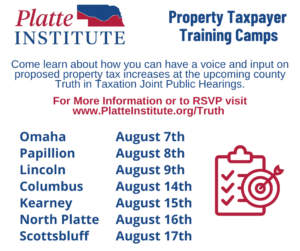Jim Vokal’s Weekly Email: shell game
It’s that time of year again, as the summer sun gradually fades, families across Nebraska start preparing for a new school year. As the back-to-school shopping lists get checked off, it is also the time when cities, counties, community colleges, and school districts across our state begin to unveil their budgets for the upcoming year.
Over the years, the Platte Institute has noticed a recurring trend with these budgets. Thanks to increased property valuations, most political subdivisions are seeing windfall revenue, meaning more money is coming in than the previous year. If the tax rate remains the same and valuations go up 15%, then revenues will also go up 15%, whether or not those new funds are needed. In this period of substantial valuation increases, the crux of our ongoing property tax crisis rests on how these additional funds are handled. Do they increase spending, or do they give it back to the taxpayer?
Drawing from my own experiences as a former elected official, I can provide insight into the tactics used to communicate these windfall scenarios. There’s a game of rhetoric at play, and it often sounds something like, “We are lowering your levy rate or keeping your rate the same,” implying they are not raising taxes. This can be and is often times misleading. The critical factor to focus on is whether a political subdivision is projected to collect more property tax revenue than in the previous year. If they are, THAT’S A PROPERTY TAX INCREASE, regardless of how they frame the levy rate.
To illustrate this point, consider Nebraska’s largest city, Omaha. They recently released their budget, boasting a 2.1% rate reduction. The reality is that city officials plan to collect approximately $18 million more in property tax revenue over the previous year – that’s an 8.5% property tax increase for that political subdivision alone.
Similarly, Lincoln Public Schools are promoting a 13 cent drop in their levy rate. However, they plan on collecting an additional $27 million in property taxes for 2023-2024. That’s a 9% property tax increase. There are countless other examples across the state and the cumulative effect is staggering for Nebraska families, businesses and ag producers.
Or think about it on a personal level. If your home valuation goes 15% and your tax rate stays the same, then your tax bill is going up 15%. It’s no consolation to hear local officials tell you that your rate is holding steady when your wallet is being increasingly emptied.
In contrast, some political subdivisions like the City of Valentine have maintained a steady level of property tax revenue collection over several years. This balanced approach of lowering the rate to offset valuation increases provides a model for how our taxation system should function.
While it’s true that rates being lowered or remaining the same are preferable to levy rate increases when valuations rise, we are not making progress on lowering property taxes until we can consistently offset valuation increases with equivalent rate reductions. Now, many of you may say that state legislation is needed to address this, but this starts at the local level.
That’s why it’s crucial to dig deeper into property tax revenue collections and pay attention to where our dollars are really going. Understanding the “shell game” being played by some of our political subdivisions is the first step towards effective change.
This is also why Truth in Taxation is so important. This year, the Platte Institute is hosting seven Truth in Taxation Taxpayer Training Camps. Our workshops prepare taxpayers for the joint public truth in taxation hearings (held in September) mandated by state law if a political subdivision’s property taxes collections go up by more than 2%. These joint hearings are the best tool we have in our toolchest to stand up to the tax increase shell game, have our voices heard and hold our public officials accountable.
Future valuation increases also need to be addressed so that Nebraska taxpayers’ budgets are not blindsided by such staggering jumps. These are necessary steps to truly alleviate the tax burden on our citizens.
Thanks for reading,
Jim
P.S. – Here’s the schedule for this year’s taxpayer training camps. All meetings start at 6:00pm local time, we hope to see you there! Check out this link to get registered.

